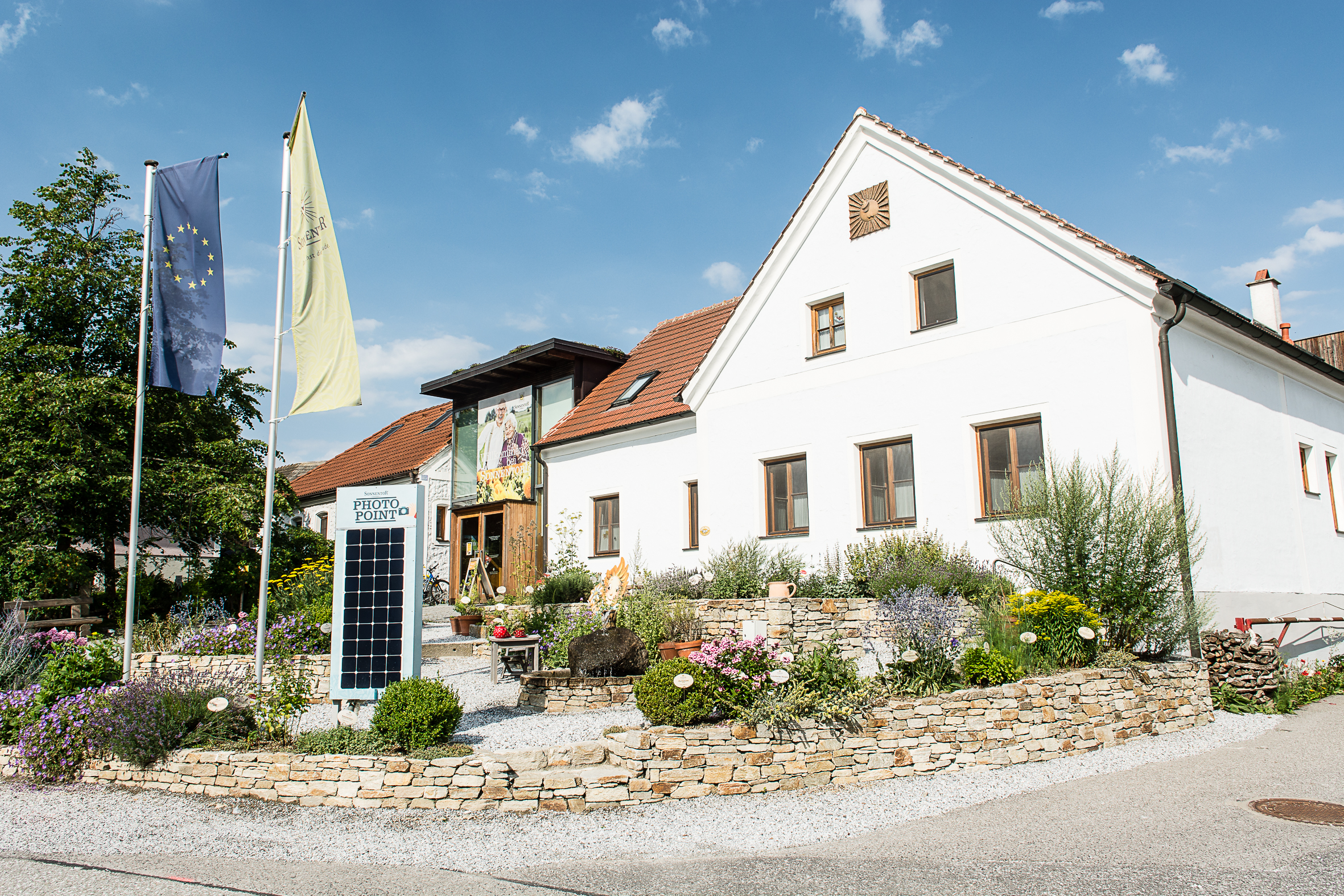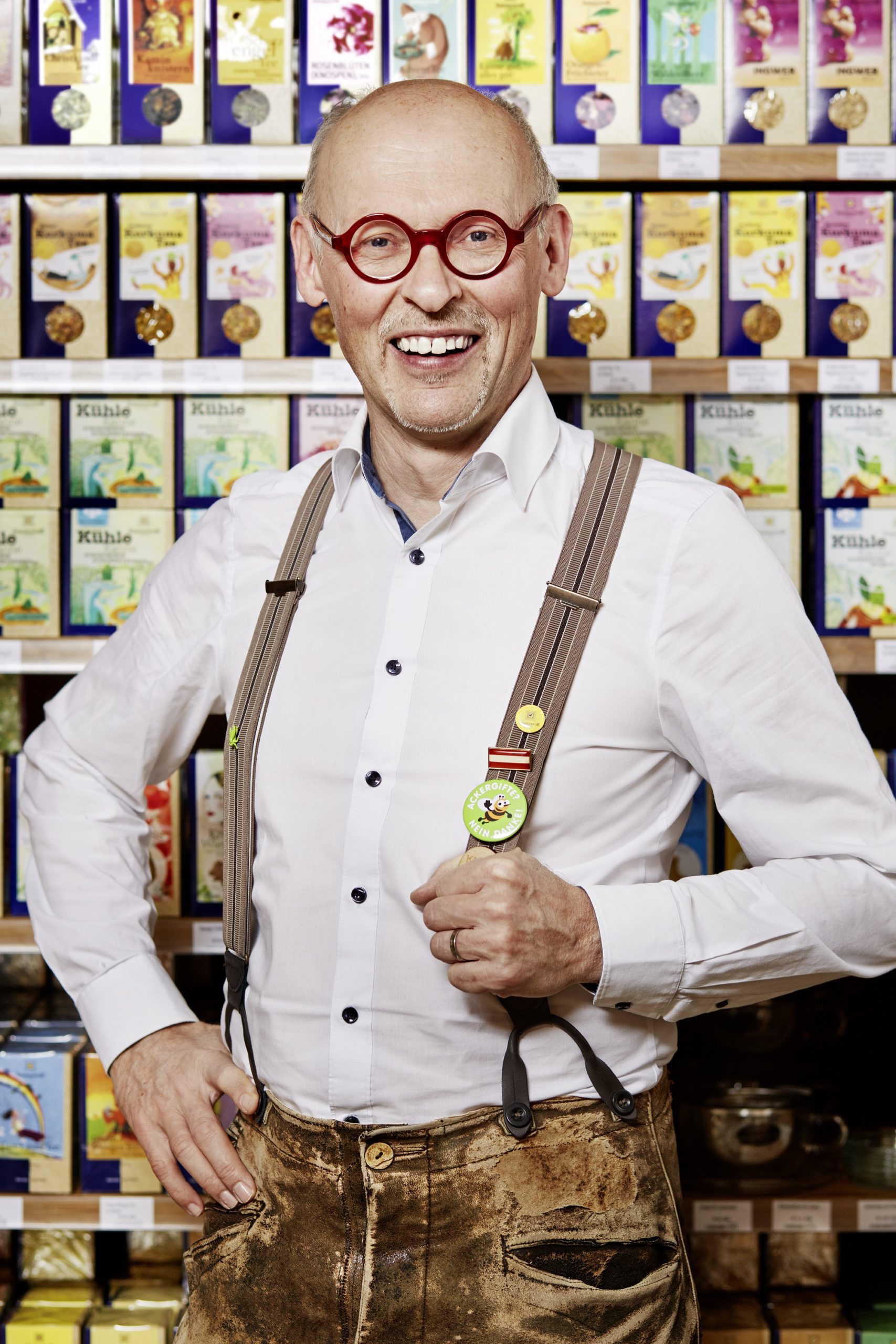SONNENTOR Kräuterhandels GmbH
The consultancy firm Trilog, the organisation ‘Qualification Alliance Waldviertel’ and the social insurance organisation for employees in Lower Austria NÖGKK support the measures at SONNENTOR.
Interview with Mrs Edith Sagaster, Human Resources Manager
Sector
Secondary: food production
Country
Austria
Web-site
www.sonnentor.com
Specialization
SONNENTOR Kräuterhandels GmbH, a distributor of organic herbs, spices and teas with a strong international brand with around 900 products, was founded in 1988 in the Waldviertel (a rural region northwest of Vienna, near the border with the Czech Republic) by Managing Director Johannes Gutmann. In 1992, an old farm in Sprögnitz (near Zwettl) was purchased for use as a registered office. It was converted into a production and distribution center and modernized and expanded over the years. Recently, the company headquarters has become a tourist attraction, offering regular guided tours, a shop, an organic café-restaurant, apartments (lofts), gardens and playgrounds, and counts about 40,000 visitors a year.
SONNENTOR currently employs 280 people at its headquarters in Austria and a further 150 at its Czech branch. The majority are workers. Further jobs were created in the 31 SONNENTOR shops in cities such as Vienna, Graz and Salzburg as well as in SONNENTOR restaurants, 19 companies are managed as franchises. A total of 500 people are employed by SONNENTOR, with the average age of the employees being 39.

SONNENTOR is committed to sustainability in the Waldviertel and extends this commitment to its employees. To this end, SONNENTOR has introduced a series of measures relating to working conditions and work organisation to address the problem of the ageing workforce.
Main motives for the decision to implement the age management measures
Sustainability and the common good are the pillars of the company philosophy. Founder Johannes Gutmann insisted on these principles from the very beginning. Age management, health measures and employee participation are part of this philosophy. So age management was planned from the beginning, you didn’t have to make a special decision.
Expected results
The measures adopted by SONNENTOR have three aims:
- to retain older workers at work, so that their experience, skills and competences are not lost;
- to attract younger workers (younger workers tend to work in Vienna instead of rural areas) and to help younger workers benefit from older workers’ experience;
- to reduce sickness absence (which is already quite low, with an average of four to five days per worker per year compared with the Austrian national average of 13 days).
SONNENTOR works hard to attract a younger generation of customers, who are willing to pay more if they know the products are healthy and sustainable. An element of this is the fair treatment of employees.
Age management dimension
Career development:
- identifying individual career ambitions and making related plans;
- tailoring career planning to occupational groups;
- using specialist advisors in systematic career consultation.
Job recruitment:
- waiving age limits in job advertisements to encourage greater age diversity.
Learning, training and lifelong learning:
- organizing work so that it is conductive to learning and development (within the framework of mixed-age teams and groups).
Health protection and promotion, and workplace design:
- ergonomic workplace (re)design;
- preventive redeployment;
- employee participation and education.
Redeployment (after long periods of absence such as child-bearing or sick leave)
Comprehensive approaches:
- an emphasis on preventing age management problems.

Our way towards the age management
In 2000, SONNENTOR’s senior management developed a set of measures to address demographic change in the company. The initiative is ongoing and is part of the company’s long-term strategy.
Implementation of the measures is supported by the Qualification Alliance, an umbrella organisation of companies within the Waldviertel region.
Implementation of measures based on Austrian legislation
In 2000, the Austrian Public Employment Service (AMS) established a package of measures to promote the employment of people aged over 45. SONNENTOR received part-financing from AMS to implement some of these measures.
As an example, some of SONNENTOR’s employees who are close to retirement have taken advantage of the ‘Altersteilzeit’ scheme (partial retirement scheme), which allows older workers to reduce their working hours for up to five years, without losing any entitlements towards pensions, insurance or unemployment benefits.
SONNENTOR also gives its retired workers the option of working marginally part-time to a limit of EUR 395 per month. Those employees carry on working in their previous area of employment or support guided company tours. The company appreciates that its retired workers, when they come back to work, bring with them their many years of experience and strong identification with the company culture. This experience and knowledge can be transferred to other employees and the individual can benefit from remaining active and experiencing a smoother transition to retirement.
Development of specific measures
SONNENTOR also put in place a number of small-scale measures to promote better working conditions for older workers. Employees are fully involved in the design of these measures to ensure that they fit their needs.


- Ergonomics: In the offices, efforts have been made to improve workers’ ergonomic situations. Equipment, such as wrist and leg supports, ergonomic chairs or balls to sit on to counteract neck and back pain, has been provided. Attention was also paid to the height of computer screens. In partnership with GEA, manufacturer of healthy ‘Waldviertler’ shoes, every SONNENTOR employee was given a voucher for EUR 150 towards a pair of shoes.
- Work adjustments: The manual handling of loads is an issue in the processing department, where workers lift heavy bags several times a day. The general limit value is 25 kg per bag, but workers have been given permission to adjust that weight according to their own capability; for example, they can choose to fill 20-kg bags to avoid heavy loads.
- Professional mobility within the company: Before new employees are recruited, attention is drawn to professional mobility within the company for existing staff. If an employee needs to change their role within the company, for instance because of health-related issues, their request is prioritised over new recruitment.
- Generation-mentor: The departments in the company are heterogeneous and consist of older workers, younger workers and workers with special needs. The company has created the position of generation-mentor, whose main task is to address older workers’ fears of losing value and being replaced by younger workers. This activity is put in place when new employees are recruited and integrated into the team. It is a group activity that focuses on fostering exchanges between the different generations and reassuring older employees that they are not being replaced by those who are younger. Actively strengthening the positive image of older workers helps to reduce common stereotypes against ageing, such as not being able to learn new things or being slow to change behaviour. The generation-mentors receive training over a six-month period from the consultancy firm Trilog, together with Qualification Alliance Waldviertel, with financial support from the Austrian Public Employment Service (AMS) and the European Social Fund (ESF).
- Sonnengsund, the company’s health promotion scheme: In the company employee survey, employees requested health promotion activities in the workplace. As a result, the company established the Sonnengsund project (a play on the company name and the dialect word for ‘healthy’), which focuses on a healthy and balanced diet (providing a company lunch for every worker), improving physical health (particularly for older workers) and promoting mental health (in particular, preventing burnout). The project is implemented through teamwork and coaching sessions. Classes in natural healing, ergonomic solutions for back pain and yoga are offered. Employees receive a gift or bonus if they participate in a certain number of sessions. Sonnengsund has been set up in collaboration with NÖGKK (Niederösterreichische Gebietskrankenkasse), the social insurance organisation for employees in Lower Austria, and Qualification Alliance Waldviertel.
Strengths and weaknesses of the chosen approaches
The following positive effects have been identified since the measures were implemented:
- Reduced sickness absence: Although sick days were already quite low (averaging four to five days per worker per year compared with the Austrian national average of 13 days), the new measures resulted in an even lower level of sickness absence and had a positive effect on company profit.
- Certification: SONNENTOR has been a pioneering company for the certification of “NESTORgold”. NESTORgold is a standard of good practice for age- and generation-sensitive labour organisation in Austrian companies and organisations. It was created by the Federal Ministry of Labour, Social Affairs and Consumer Protection and the Public Employment Service in 2010.
Beneficial effects of the initiative
- Holistic approach: SONNENTOR’s management has implemented a package of measures that addresses the issues of ageing, demographic change in the company and health and safety at work from various perspectives, such as working conditions and working hours, prevention of health problems, workplace health promotion, generation management, mentoring and transition to retirement.
- Dedication to older workers: With the creation of the generation-mentor position, SONNENTOR has demonstrated that it values its older employees and aims to avert any fear of replacement or dismissal because of age.
- Communication: A mixture of formal and informal communication channels are used. An example of formal communication is the employees’ survey. On the other hand, regular informal, but respectful, contact between the human resources department and the employees takes place, usually in a relaxed atmosphere, such as during breaks, ensuring a productive exchange of ideas. In addition, workers can raise any problem at any time with management and know that they will be supported. Few problems that have been raised have been left unresolved, although more complex problems, such as those requiring investment (e.g. buying a new machine), can take longer to resolve.
- Employee participation: In general, employees are consulted on the initiatives put in place and have the opportunity to give their input.
- Flexible and tailored measures: According to the human resources manager interviewed, employees appreciate that the measures are flexible and can be easily adapted to individual situations.

Tha “aha!” moment experienced during the process
“You have to prove that you take it seriously!” Johannes Gutmann had this experience.
People once thought he was a spinner, a romancer. It was only when he had also started the “Frei-Hof” project – an organic farm run according to permaculture, which invites everybody to participate and learn, that he was accepted by the regional population.
Activities to sustain this initiative
Johannes Gutmann insists on the location of SONNENTOR in the structurally weak Waldviertel district: “We invest the profit where it is generated. We pay taxes locally. The money goes back to the infrastructure at the company location. This is a sustainable cycle. In that way we are totally political in our actions.” Healthy growth has already created around 330 jobs. Services such as company childcare, free organic lunches, as well as a varied health program are available to employees. The company’s goal is to maximize the common good. For this reason, SONNENTOR has been part of the common good economy since 2011.
Benefits for employees: Free organic lunches (180 to 200 take advantage per day), health promotion program – sports courses (e.g. yoga, back-fit or Zumba), lectures, cooking shows and health checks. Employee discount, minus 20% on SONNENTOR products. Childcare SONNENSCHEINCHEN – 20 children registered 16 of employees /4 externally from the region, 13 max. present at the same time.
Monitoring system of the effects
The associated balance sheet of the common good economy makes the work in the field of sustainability measurable and comparable with other companies. SONNENTOR provides its common good economy – balance sheet since 2011. A form of transparency that many companies are still shying away from.
Recently, a dedicated CSR-manager has also strengthened the team. Stephan Strasser-Altrogge not only wants to secure the appropriate measures at the site in the Waldviertel – his goal is also to support the cultivation projects. In this way, the aim is to develop social and environmental standards directly on the ground.
As part of the direct community at the site, the company acts in a social, cultural and political environment. In particular, the CSR strategy includes responsibility for development and community action within its own region.
Personal recommendation
“Whoever spins wins!” is the insight of Johannes Gutmann. Most crises are really opportunities, it is important to believe in one’s own ideas.
“I don’t want to wait until potatoes or even herbs are successfully planted on Mars, because nothing thrives on Earth anymore,” Gutmann emphasizes, adding: “I want to inspire people to live in the cycle of nature. Only in this way can we collectively carry the ecological idea out into the world and shape a future suitable for the grandchildren.”
His book is published by Styria-Verlag under the title “Whoever spins, wins!”. In it, the bio-pioneer gives impressive and private insights into his life path, tells stories about joy, courage and gut feeling.
The measures that SONNENTOR put in place are transferable to other companies, provided the company has sufficient resources and/or support from national employment programmes or social insurance organisations. As well as financial support, Qualification Alliance Waldviertel offers opportunities for exchange of good practice and mutual learning. Other companies from this region can benefit from the measures and ideas that have been generated at SONNENTOR.
It is worth noting, though, that one of the success factors for implementation is that most of the measures were tailored to the specific needs of the employees in SONNENTOR. Adaptations may be required for implementation in other companies or sectors. However, the relative lack of bureaucracy required to implement these measures means that they could be put in place in smaller companies with less formally structured human resources departments.
Based on the publication: Adapting to an ageing workforce, Sonnentor, Austria, by EU-OSHA – European Agency for Safety and Health at Work
Fotocredit: ©SONNENTOR
